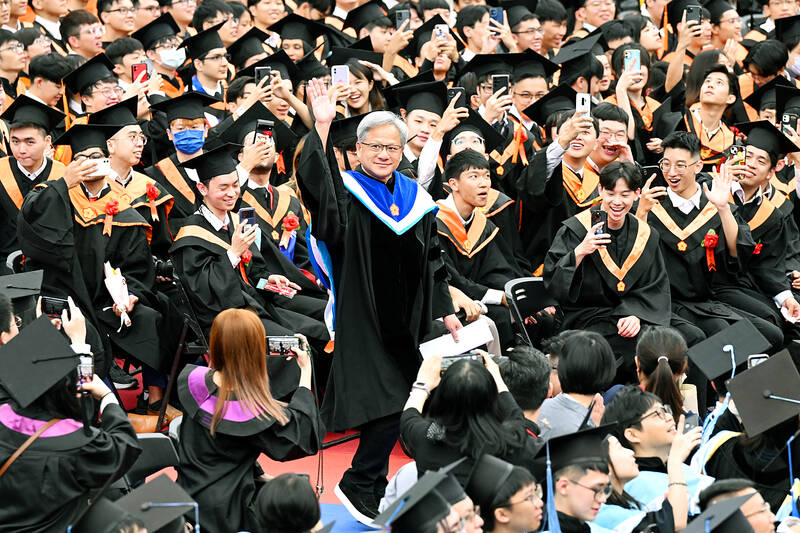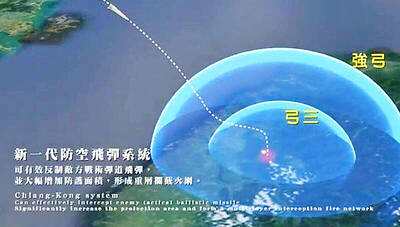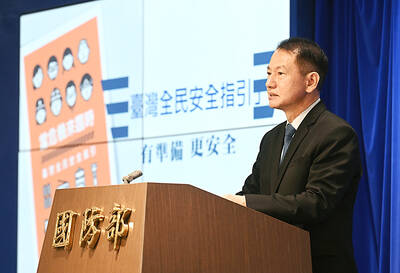Artificial intelligence (AI) is redefining the computer industry, and Taiwanese companies could play a major role in replacing the world’s traditional computers as they are the foundation of the industry, Nvidia Corp cofounder and CEO Jensen Huang (黃仁勳) said in Taipei yesterday.
Huang made the remarks while giving the keynote speech at National Taiwan University’s (NTU) commencement ceremony.
AI has created immense opportunities, and versatile companies can be expected to take advantage and boost their position, while less flexible firms would perish, he said.

Photo: Liao Chen-huei, Taipei Times
“In every way, this is a rebirth of the computer industry and a golden opportunity for the companies of Taiwan,” he said, adding that as the foundation of the computer industry, Taiwanese companies, within the next decade, would replace US$1 trillion of the world’s traditional computers with AI-accelerated computers.
Graduating students must learn to “take advantage of AI and do amazing things with an AI copilot by your side,” Huang said, adding that instead of worrying that AI would take over jobs, they should instead worry that people with expertise in AI could and would take other people’s jobs.
He said that graduating students are on the precipice of a great technological shift, and while his graduating class of 1984 witnessed how the personal computer revolution gave birth to the software industry of today, AI “is far more fundamental, because every computing layer has been reinvented. From how we write software, to how it’s processed, AI has reinvented computing from the ground up.”
“AI software has opened the door for computers to automated tasks for the world’s largest [multitrillion-dollar industry] — healthcare, finances, transportation and manufactories,” he said.
At the ceremony, NTU president Chen Wen-chang (陳文章) announced that NTU would be partnering with Nvidia to establish an AI center that would promote the use of AI in the university.
The project would incorporate AI “teachers” in classes to experiment with the use of AI software in education across all of the university’s campuses, Chen said, adding that NTU would also work with Nvidia to research AI software and related topics.
Nvidia on Wednesday said that due to the acceleration of AI applications, its sales for this quarter are expected to reach US$11 billion, up 64 percent from a year earlier and more than an early market estimate of US$7.2 billion.
The company posted more than US$2 billion in net profit and US$7 billion in sales for the first quarter, again beating analysts’ expectations.
Shares in the company on Thursday surged 24.4 percent on US markets due to optimism regarding AI applications. Nvidia shares gained an additional 2.54 percent on Friday.
Huang is tomorrow scheduled to deliver the opening speech at Computex Taipei, one of the world’s largest computer trade fairs.
Additional reporting by CNA

LIMITS: While China increases military pressure on Taiwan and expands its use of cognitive warfare, it is unwilling to target tech supply chains, the report said US and Taiwan military officials have warned that the Chinese People’s Liberation Army (PLA) could implement a blockade within “a matter of hours” and need only “minimal conversion time” prior to an attack on Taiwan, a report released on Tuesday by the US Senate’s China Economic and Security Review Commission said. “While there is no indication that China is planning an imminent attack, the United States and its allies and partners can no longer assume that a Taiwan contingency is a distant possibility for which they would have ample time to prepare,” it said. The commission made the comments in its annual

DETERMINATION: Beijing’s actions toward Tokyo have drawn international attention, but would likely bolster regional coordination and defense networks, the report said Japanese Prime Minister Sanae Takaichi’s administration is likely to prioritize security reforms and deterrence in the face of recent “hybrid” threats from China, the National Security Bureau (NSB) said. The bureau made the assessment in a written report to the Legislative Yuan ahead of an oral report and questions-and-answers session at the legislature’s Foreign Affairs and National Defense Committee tomorrow. The key points of Japan’s security reforms would be to reinforce security cooperation with the US, including enhancing defense deployment in the first island chain, pushing forward the integrated command and operations of the Japan Self-Defense Forces and US Forces Japan, as

INTERCEPTION: The 30km test ceiling shows that the CSIST is capable of producing missiles that could stop inbound missiles as they re-enter the atmosphere Recent missile tests by the Chungshan Institute of Science and Technology (CSIST) show that Taiwan’s missiles are capable of intercepting ballistic missiles as they re-enter the atmosphere and pose a significant deterrent to Chinese missile threats, former Hsiung Feng III missile development project chief engineer Chang Cheng (張誠) said yesterday. The military-affiliated institute has been conducting missile tests, believed to be related to Project Chiang Kung (強弓) at Pingtung County’s Jiupeng Military Base, with many tests deviating from past practices of setting restriction zones at “unlimited” and instead clearly stating a 30.48km range, Chang said. “Unlimited” restrictions zones for missile tests is

PUBLIC SAFETY: The nationwide distribution campaign aims to enhance society’s overall understanding of threats and bolster defense awareness, an official said The latest edition of the National Public Safety Guide is being mailed to all citizens starting today to foster public awareness of self-defense in the event of war or natural disasters, the Ministry of National Defense said yesterday. “The guides will be disseminated to the public to enhance society’s overall understanding of threats and bolster defense awareness, demonstrating the government’s emphasis on people’s safety and its determination to pursue self-defense,” All-out Defense Mobilization Agency Director Shen Wei-chih (沈威志) said at the ministry’s news conference. The nationwide distribution campaign was planned according to President Lai William’s (賴清德) Sept. 20 directive, he said, adding